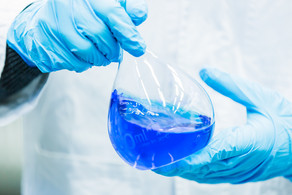Career opportunities
Professional fields for graduates of chemistry
The natural science of chemistry deals with the properties and transformations of chemical substances. This results in a wide range of activities for chemists in the chemical and pharmaceutical industry as well as in other professional fields.
Research and development in chemistry contributes significantly to progress in various fields such as environmental protection, transport technology, information and computer technology and medicine. Due to the limited supply of fossil fuels and global warming, new energy sources must be increasingly developed in the future and raw material reserves must be better utilized through recycling. Integrated environmental protection also requires the development of environmentally compatible products, the consistent further development of production processes and their control by reliable and sensitive analytical methods. The new or further development of materials with defined properties and the synthesis of new active ingredients with a specific action profile are also challenges for chemists.
As exemplary analyses of job advertisements in 2014 have shown, bachelor's graduates are primarily sought after in the fields of analytical chemistry and technical chemistry, but also for tasks in organization, evaluation, procurement and documentation. However, the job market is still underdeveloped. Most students therefore follow a Master's program after the Bachelor's program. Master's graduates can, for example, work in the fields of analytics, production, sales, quality assurance, project management and patents. But there are also career opportunities outside the chemical and related industries, such as in insurance and management consulting. Most students, however, follow the master's program with a doctorate (PhD). On the one hand, graduates with a doctorate have more opportunities to work in research and development and, on the other hand, they often take on a management position in the company right at the beginning of their professional life. The earning opportunitiesand are good to very good.
Professional fields for graduates of chemical biology
In research, a rapidly growing frontier area between biology and chemistry, chemical biology, is establishing itself. It deals with chemical processes in biological systems. The Chemical Biology course differs from biochemistry courses in that it is more chemically oriented and specifically highlights topics from the border area between chemistry and biology, such as the chemical synthesis of biologically active substances, the development of biosensors or targeted chemical modifications of biomolecules. Special areas from classical biology, such as botany, zoology or ecology, are not relevant to chemical biology and are therefore not covered. The Chemical Biology course is conducted with the participation of the neighboring renowned Max Planck Institute of Molecular Physiology in Dortmund and is the first of its type in Germany.
The orientation of the program is aimed at research and development in the field of molecular biotechnology with topics such as new drug substances, biomedical analytics and diagnostics. Chemical biologists can also work in the food and cosmetics industry and in medical device development. A further, very important professional field is basic biological and medical research. In this highly topical field, the profound education in chemistry is of great benefit to chemical biologists.
As exemplary analyses of job advertisements in 2014 have shown, Bachelor graduates are primarily sought in the fields of pharmaceutical analytics and diagnostics for the organization of studies, the further development of existing test systems, evaluation, procurement and documentation. The job market for Bachelor's graduates is still very limited. However, it is possible that it will develop further in the coming years. Most students are currently pursuing a master's degree after their bachelor's degree. Master's graduates can work in the fields of diagnostics, analytics, production, sales, quality assurance, project management, approval procedures, patents, etc. Outside the pharmaceutical and related industries, there are career opportunities in the insurance industry and in management consulting, for example. The majority of students complete a doctorate (dissertation) after completing their studies. On the one hand, graduates with a doctorate have more opportunities to work in research and development, and on the other hand, they often take up a management position in the company right at the beginning of their professional life. Graduates have good to very good earning opportunities, depending on the degree.





